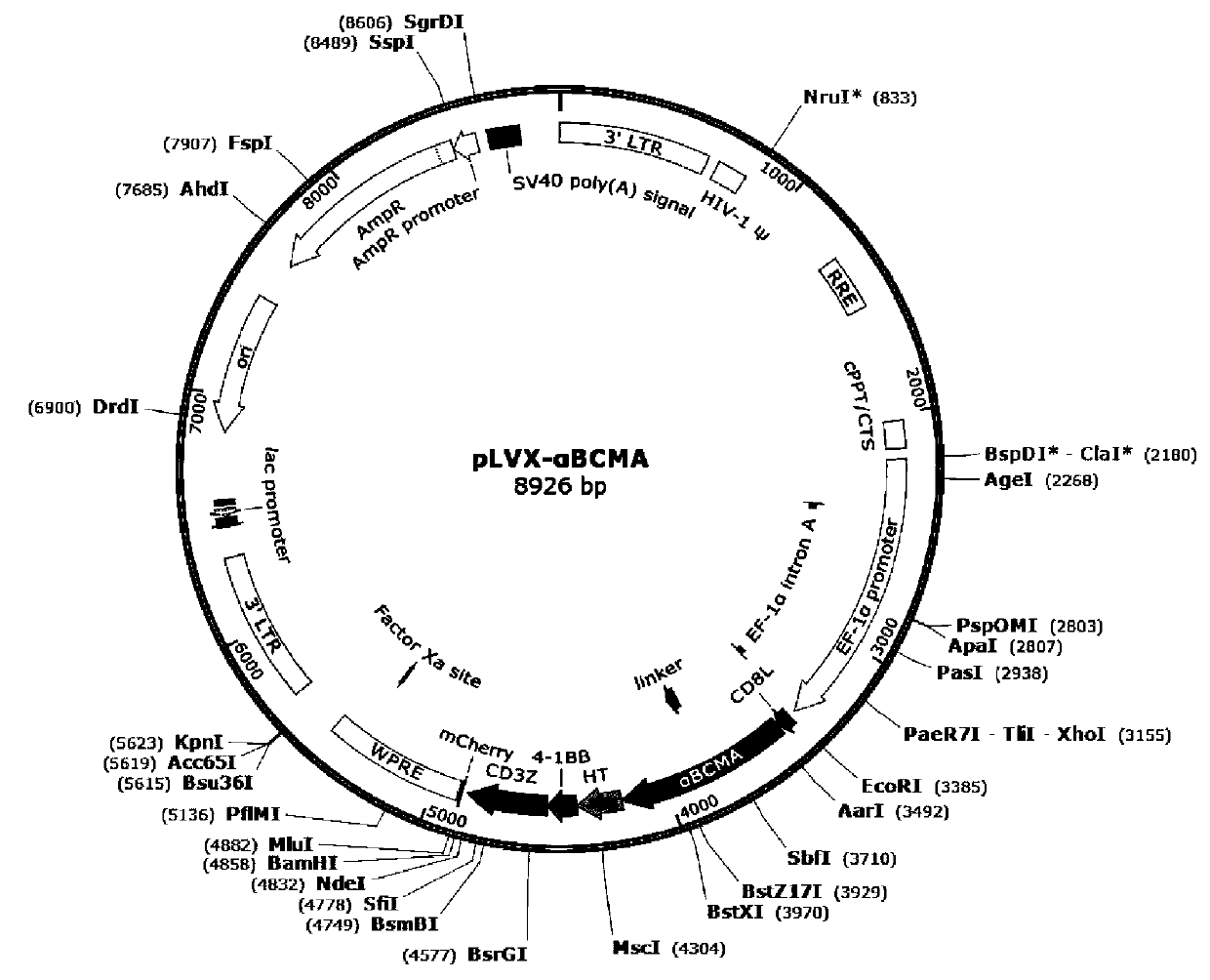A bispecific chimeric antigen receptor targeting bcma and cd19 and its application
A chimeric antigen receptor, bispecific technology, applied in the application of anti-tumor therapy, the construction of chimeric antigen receptor T cell technology, can solve the problems of reduced CD19 expression and easy escape from immune mechanisms, etc.
- Summary
- Abstract
- Description
- Claims
- Application Information
AI Technical Summary
Problems solved by technology
Method used
Image
Examples
Embodiment 1
[0070] Example 1: Design of chimeric antigen receptor
[0071] This example constructed anti-BCMA and anti-CD19 bispecific chimeric antigen receptors (B(G)19 and 19(G)B), anti-BCMA chimeric antigen receptors and anti-CD19 chimeric antigen receptors , The sequence diagram is as figure 1 As shown, the chimeric antigen receptor includes a CD8α signal peptide sequence (Leader), a bispecific antibody sequence that specifically binds to BCMA and CD19 antigens, an anti-BCMA single domain antibody and an anti-CD19 single domain antibody, CD8α The hinge region (Hinge) and transmembrane region sequence (Transmembrane), 4-1BB costimulatory domain sequence and CD3ζ signaling domain sequence, the specific partial sequences are as follows:
[0072] CD8α signal peptide (leader) amino acid sequence (SEQ ID NO.11): MALPVTALLLPLALLLHAARP;
[0073] CD8α signal peptide (leader) nucleotide sequence (SEQ ID NO.12):
[0074] ATGGCACTGCCAGTGACAGCCCTGCTGCTGCCACTGGCCCTGCTGCTGCACGCAGCACGCCCT;
[0075] The amino...
Embodiment 2
[0090] Example 2: Construction of anti-BCMA chimeric antigen receptor expression vector
[0091] (1) Complete gene synthesis of B(G)19CAR, 19(G)B CAR, BCMA CAR, and CD19CAR sequences. Use EcoRI and BamHI to digest the fully synthesized CAR and empty vector. After digestion in 37℃ water bath for 30 minutes , Use 1.5% agarose gel for DNA electrophoresis, and then use Tiangen's agarose gel kit for purification and recovery;
[0092] (2) Connection between pLVX-EF1-MCS vector and CAR gene fragment:
[0093] The connection system is as follows:
[0094]
[0095]
[0096] After ligation at 22°C for 1 hour, the ligation product was directly transformed into Stbl3 E. coli competent cells. 200 μl of the transformed product was coated on an ampicillin-resistant LB plate. The LB plate was incubated in an incubator at 37°C overnight. Three single clones were randomly selected the next morning for colony PCR identification, and positive clones were sent for sequencing.
[0097] The elements of the...
Embodiment 3
[0098] Example 3: Lentivirus packaging
[0099] The lentiviral expression vectors in the examples were separately packaged with a four-plasmid system. The specific steps are as follows:
[0100] (1) The four-plasmid system expresses the gag / pol, Rev, VSV-G required for lentiviral vector packaging and the artificial chimeric antigen receptor composed of the engineered stable single-chain antibody of the present invention: the four plasmids are transiently transfected into 293T Cells, the total mass is 10μg;
[0101] (2) Add the above plasmid to a certain volume of serum-free DMEM, mix well and leave it for 15 minutes, add the above mixture to the T75 culture flask with 293T cells, mix gently, and incubate at 37℃, 5 %CO 2 Culture in a cell incubator for 6 hours;
[0102] (3) After 6 hours, replace the fresh medium, continue the culture, and add 10 mM sodium butyrate solution. After 72 hours, collect the culture supernatant of the lentivirus for purification detection.
PUM
 Login to View More
Login to View More Abstract
Description
Claims
Application Information
 Login to View More
Login to View More - R&D
- Intellectual Property
- Life Sciences
- Materials
- Tech Scout
- Unparalleled Data Quality
- Higher Quality Content
- 60% Fewer Hallucinations
Browse by: Latest US Patents, China's latest patents, Technical Efficacy Thesaurus, Application Domain, Technology Topic, Popular Technical Reports.
© 2025 PatSnap. All rights reserved.Legal|Privacy policy|Modern Slavery Act Transparency Statement|Sitemap|About US| Contact US: help@patsnap.com



